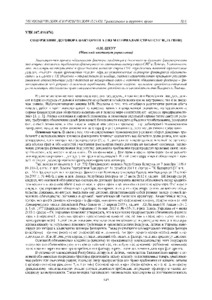Please use this identifier to cite or link to this item:
https://elib.psu.by/handle/123456789/7868Full metadata record
| DC Field | Value | Language |
|---|---|---|
| dc.contributor.author | Шкут, О. Н. | - |
| dc.date.accessioned | 2014-11-21T12:51:04Z | - |
| dc.date.available | 2014-11-21T12:51:04Z | - |
| dc.date.issued | 2014 | - |
| dc.identifier.citation | Вестник Полоцкого государственного университета. Серия D, Экономические и юридические науки : научно-теоретический журнал. - 2014. - № 6. – C.145-148. | ru_RU |
| dc.identifier.issn | 2070-1632 | - |
| dc.identifier.uri | https://elib.psu.by/handle/123456789/7868 | - |
| dc.description | Contents Factoring Agreement (Based on the Cis and Latvia)/ O. Shkut | ru_RU |
| dc.description.abstract | Анализируются права и обязанности фактора, кредитора и должника по договору финансирования под уступку денежного требования (факторинга) по законодательству стран СНГ и Латвии. Установлено, что, несмотря на отсутствие в гражданских кодексах стран СНГ определения понятий «финансовые услуги», «услуги», «иные финансовые услуги», «другие установленные договором факторинга обязательства», а в случае с ГК Молдовы – отсутствием их вообще, главным отличительным признаком рассматриваемых сопутствующих услуг является их неразрывная связь с основной обязанностью фактора – финансированием под уступку денежного требования. Выявлены спорные моменты гражданско-правовой регламентации, предложены пути совершенствования гражданского законодательства Беларуси и Латвии.= The article analyzes the rights and responsibilities of factors creditor and the debtor under the contract financing receivable financing (factoring) under the laws of the CIS and Latvia. Found that, despite the lack of civil codes CIS definitions of “financial services”, “service”, “other financial services”, “other established factoring contract obligations”, and in the case of the Civil Moldova – the lack of them in general, the principal distinguishing considered a sign of related services is inextricably linked with their main duty factor-accounts receivable financing requirements. The study identified the author of the controversial moments in their civil and legal regulation and suggests ways to improve the civil legislation of Belarus and Latvia. | ru_RU |
| dc.language.iso | ru | ru_RU |
| dc.publisher | Полоцкий государственный университет | ru_RU |
| dc.relation.ispartof | Веснік Полацкага дзяржаўнага ўніверсітэта. Серыя D, Эканамічныя і юрыдычныя навукі | be_BE |
| dc.relation.ispartof | Herald of Polotsk State University. Series D, Economics and law sciences | en_EN |
| dc.relation.ispartof | Вестник Полоцкого государственного университета. Серия D, Экономические и юридические науки | ru_RU |
| dc.relation.ispartofseries | Серия D, кономические и юридические науки;2014. - № 6 | - |
| dc.rights | open access | ru_RU |
| dc.subject | Право | ru_RU |
| dc.subject | факторинг | ru_RU |
| dc.subject | договор факторинга | ru_RU |
| dc.subject | сравнительно-правовой анализ | ru_RU |
| dc.subject | гражданское законодательство | ru_RU |
| dc.subject | страны СНГ | ru_RU |
| dc.subject | Латвия | ru_RU |
| dc.title | Содержание договора факторинга (по материалам стран СНГ и Латвии) | ru_RU |
| dc.type | Article | ru_RU |
| dc.identifier.udc | 347.4/.5 | - |
| Appears in Collections: | 2014, № 6 | |
Files in This Item:
| File | Description | Size | Format | |
|---|---|---|---|---|
| 145-148.pdf | 448 kB | Adobe PDF |  View/Open |
Items in DSpace are protected by copyright, with all rights reserved, unless otherwise indicated.